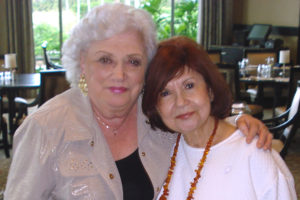
By Rachel Patron
How often you hear people say: This sort of thing happens to others – but never to me! Until it happened to me! Like winning the lottery, but much better.
One recent Tuesday evening in Boca Raton, Florida, I attended a dinner sponsored by the Holocaust Museum in Washington, D.C. Among the huge crowd, 70 survivors, including myself, were honored, I guess for having survived. Special pins adorned our lapels and corsages were tied to our wrists. It was a festive, even happy, occasion.
A young woman sitting next to me annoyed me with questions I’ve always tried to avoid. To escape, I walked over to the next table to greet a friend who was chatting with a pretty blond woman. My friend introduced us: “Rachel Patron, Zelda Fuksman. Zelda was also in a concentration camp in Siberia.” No big deal, I thought, I’d met Siberian prisoners before.
“Where were you?” Zelda asked.
“Biysk,” I answered.
That’s when decorum ended. “Biysk!” we both cried and fell into each other’s arms. I was surprised to feel myself crying since I consider myself a stoic individual. Now I felt tears rolling down my cheeks. And Zelda was weeping along with me. People around us became quiet, gawking. As we had no intention to share this moment, we adjourned into the lobby and sat in a corner.
You see, in the 73 years since we left Biysk, neither of us had met anyone who had been there. Moreover, we had never met anyone who had heard about that place and what had happened there during World War II. Over the years, I occasionally felt that it was a hidden nightmare, privy only to my parents, my older brother and me. Maybe, like “Brigadoon,” it sleeps for 100 years and will come to life long after I’m gone.
But here was a witness, a flesh and blood mortal who was saying: “Yes, it exists,” and we were both there from age 5 to 10.
We, the Rubinows, lived in the city of Bialystok, Poland, 40 kilometers from the Soviet Union. In September 1939, when Hitler attacked Poland, the Nazis and Soviets signed a sweetheart deal to divide Poland between them; the west, with Warsaw and Krakow, to Germany; the east, with Bialystok, to Russia.
In Bialystok the Bolsheviks confiscated all private property and bank accounts. More sinister was their project to deport Bialystok’s entire population of 100,000 people to Siberia and replace them with indigenous Russians. First in line were the rich and intelligentsia. Our turn came on the night of June 22, 1941. Exactly 14 hours later, at 4 p.m., the Luftwaffe bombed Kiev and World War II engulfed Europe and Asia.
As we sped northeast on the Trans-Siberian Railroad, Zelda’s family, the Fuksmans, who had lived on a farm in the village of Bober, were also uprooted and sent to Biysk as political prisoners.
Biysk was an eerie place, since no one had designed it as a city. Before us were wooden huts, haphazardly scattered on mud-encrusted dirt roads, the mud soon to be covered with mountains of pristine, white snow. Originally, Biysk had been a czarist penal colony, without electricity, running water or paved roads. Three months of summer gave way to nine months of winter, with temperatures often dipping to minus-60.
Both our families were housed in filthy, abandoned barracks. My parents and brother worked in a quarry, piling rocks that no one would ever use. Food was scarce, our rations consisting of a slice of bread in the morning and a bowl of gruel at night.
A few years ago, while living in Connecticut, I was addressing a class of high school seniors and I was asked to name my worst childhood memory. I have two, I said. First, was the miracle that my parents didn’t lose me. I was very small and thought of myself as a satchel that you may put down on the side of a train platform and when you turn around to fetch it, it’s gone, never to be recovered.
My second most awful memory was being hungry all the time. I had forgotten what good food tasted like. All I dreamed of was an extra slice of bread and soup with things in it, like meat or chicken. Also, fancifully, a glass of milk at bedtime.
The Holocaust dinner was lovely, but Zelda and I missed the main course, so absorbed were we with each other. We cried some more and pledged to be sisters forever.
Rachel Patron is a former resident of West Hartford. She lives in Boca Raton, Florida.







 Southern New England Jewish Ledger
Southern New England Jewish Ledger













